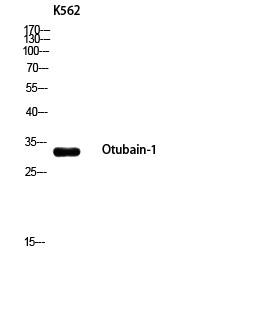Otubain-1 Polyclonal Antibody
- Catalog No.:YT5679
- Applications:WB;ELISA
- Reactivity:Human;Mouse;Rat
- Target:
- Otubain-1
- Gene Name:
- OTUB1
- Protein Name:
- Ubiquitin thioesterase OTUB1
- Human Gene Id:
- 55611
- Human Swiss Prot No:
- Q96FW1
- Mouse Gene Id:
- 107260
- Mouse Swiss Prot No:
- Q7TQI3
- Rat Gene Id:
- 293705
- Rat Swiss Prot No:
- B2RYG6
- Immunogen:
- Synthesized peptide derived from Otubain-1 . at AA range: 20-100
- Specificity:
- Otubain-1 Polyclonal Antibody detects endogenous levels of Otubain-1 protein.
- Formulation:
- Liquid in PBS containing 50% glycerol, 0.5% BSA and 0.02% sodium azide.
- Source:
- Polyclonal, Rabbit,IgG
- Dilution:
- WB 1:500 - 1:2000. ELISA: 1:10000. Not yet tested in other applications.
- Purification:
- The antibody was affinity-purified from rabbit antiserum by affinity-chromatography using epitope-specific immunogen.
- Concentration:
- 1 mg/ml
- Storage Stability:
- -15°C to -25°C/1 year(Do not lower than -25°C)
- Other Name:
- OTUB1;OTB1;OTU1;HSPC263;Ubiquitin thioesterase OTUB1;Deubiquitinating enzyme OTUB1;OTU domain-containing ubiquitin aldehyde-binding protein 1;Otubain-1;hOTU1;Ubiquitin-specific-processing protease OTUB1
- Observed Band(KD):
- 31kD
- Background:
- OTU deubiquitinase, ubiquitin aldehyde binding 1(OTUB1) Homo sapiens The product of this gene is a member of the OTU (ovarian tumor) superfamily of predicted cysteine proteases. The encoded protein is a highly specific ubiquitin iso-peptidase, and cleaves ubiquitin from branched poly-ubiquitin chains but not from ubiquitinated substrates. It interacts with another ubiquitin protease and an E3 ubiquitin ligase that inhibits cytokine gene transcription in the immune system. It is proposed to function in specific ubiquitin-dependent pathways, possibly by providing an editing function for polyubiquitin chain growth. Alternative splicing results in multiple transcript variants. [provided by RefSeq, Jul 2008],
- Function:
- function:Hydrolase that can remove conjugated ubiquitin from proteins in vitro and may therefore play an important regulatory role at the level of protein turnover by preventing degradation. Regulator of T-cell anergy, a phenomenon that occurs when T-cells are rendered unresponsive to antigen rechallenge and no longer respond to their cognate antigen. Acts via its interaction with RNF128/GRAIL, a crucial inductor of CD4 T-cell anergy. Isoform 1 destabilizes RNF128, leading to prevent anergy. In contrast, isoform 2 stabilizes RNF128 and promotes anergy. Surprisingly, it regulates RNF128-mediated ubiquitination, but does not deubiquitinate polyubiquitinated RNF128.,similarity:Belongs to the peptidase C65 family.,similarity:Contains 1 OTU domain.,subunit:Isoform 1 and isoform 2 interact with RNF128. Isoform 1 forms a ternary complex with RNF128 and USP8. Isoform 1 interacts with the C-termi
- Subcellular Location:
- Cytoplasm .
- Expression:
- Isoform 1 is ubiquitous. Isoform 2 is expressed only in lymphoid tissues such as tonsils, lymph nodes and spleen, as well as peripheral blood mononuclear cells.
- June 19-2018
- WESTERN IMMUNOBLOTTING PROTOCOL
- June 19-2018
- IMMUNOHISTOCHEMISTRY-PARAFFIN PROTOCOL
- June 19-2018
- IMMUNOFLUORESCENCE PROTOCOL
- September 08-2020
- FLOW-CYTOMEYRT-PROTOCOL
- May 20-2022
- Cell-Based ELISA│解您多样本WB检测之困扰
- July 13-2018
- CELL-BASED-ELISA-PROTOCOL-FOR-ACETYL-PROTEIN
- July 13-2018
- CELL-BASED-ELISA-PROTOCOL-FOR-PHOSPHO-PROTEIN
- July 13-2018
- Antibody-FAQs
- Products Images

- Western blot analysis of K562 using Otubain-1 antibody. Secondary antibody(catalog#:RS0002) was diluted at 1:20000



